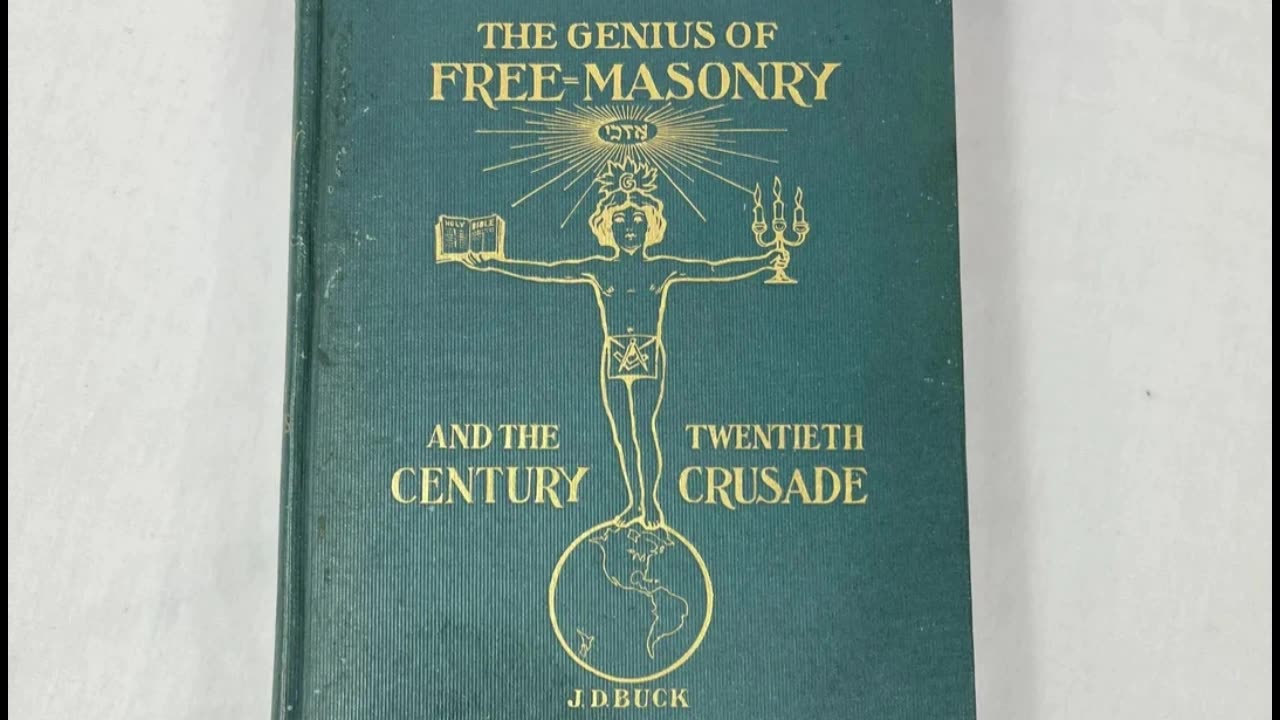Premium Only Content

The Genius of Freemasonry and the Twentieth-Century Crusade by: J.D. Buck (1914)
"The Genius of Freemasonry and the Twentieth-Century Crusade" by J.D. Buck is a profound exploration of Freemasonry, delving into its philosophies, principles, and its envisioned role in the modern world. Published in 1914, the book is a product of its time, reflecting the early 20th-century concerns and aspirations. Buck presents Freemasonry not just as a fraternal organization but as a pivotal force for moral and spiritual development.
The text emphasizes the universal truths and ethical teachings of Freemasonry, advocating for its potential to foster a global movement towards enlightenment and human betterment. Buck argues that the core tenets of Freemasonry—truth, justice, brotherhood, and the pursuit of knowledge—are essential for the advancement of society. He envisions a "Twentieth-Century Crusade" where Freemasonry plays a central role in overcoming ignorance, superstition, and tyranny, thus contributing to the progress of humanity.
The book is both a defense of Freemasonry against its critics and a call to action for its members to live up to the high ideals espoused by the order. It addresses various misconceptions about Freemasonry, clarifies its aims, and highlights its historical significance and future potential.
About the Author:
James Denton Buck (1838–1916), known as J.D. Buck, was a prominent American physician, writer, and Freemason. Born in Ohio, Buck pursued a career in medicine, becoming a respected homeopathic physician. However, his interests were not confined to the medical field; he was deeply engaged in esoteric studies, metaphysics, and the philosophical aspects of Freemasonry.
Buck was an ardent supporter and active member of the Masonic fraternity, contributing significantly to Masonic literature. He was a 33rd Degree Freemason within the Ancient and Accepted Scottish Rite of Freemasonry, reflecting his high standing and deep involvement in the craft. He was a member of Kilwinning Lodge No. 356 in Cincinnati, Ohio, and held various significant positions within the fraternity.
In addition to "The Genius of Freemasonry and the Twentieth-Century Crusade," Buck authored several other notable works, including "Mystic Masonry" and "The Symbolism of Freemasonry," wherein he explored the symbolic and allegorical aspects of the craft. His writings remain influential in Masonic circles, valued for their depth of insight and commitment to the higher ideals of Freemasonry. His contributions to the fraternity through his writings and active participation have left a lasting impact on Freemasonry, particularly in the philosophical and esoteric dimensions he so passionately advocated.
-
 3:59:19
3:59:19
Deus Meum Que Jus
27 days agoThe Kybalion: A Study of the Hermetic Philosophy of Ancient Egypt and Greece By: The Three Initiates
527 -
 3:00:24
3:00:24
I_Came_With_Fire_Podcast
9 hours agoHalf the Gov. goes MISSING, Trump day 1 Plans, IC finally tells the Truth, Jesus was NOT Palestinian
24.8K14 -
 4:11:49
4:11:49
Nerdrotic
12 hours ago $32.86 earnedThe Best and Worst of 2024! Sony Blames Fans | Batman DELAYED | Nosferatu! |Friday Night Tights 334
160K29 -
 7:55:51
7:55:51
Dr Disrespect
16 hours ago🔴LIVE - DR DISRESPECT - WARZONE - SHOTTY BOYS ATTACK
215K30 -
 1:30:23
1:30:23
Twins Pod
15 hours agoHe Went From MARCHING With BLM To Shaking Hands With TRUMP! | Twins Pod - Episode 45 - Amir Odom
130K30 -
 1:02:30
1:02:30
Exploring With Nug
16 hours ago $3.70 earned2 Duck Hunters Missing After Kayak Capsizes!
58K4 -
 46:48
46:48
Mally_Mouse
10 hours agoLet's Hang!! -- Opening Christmas gifts from YOU!
67.8K1 -
 44:55
44:55
Athlete & Artist Show
20 days ago $2.04 earnedNHL 4 Nations Snubs, Was Hawk Tuah Coin A Scam?
65.7K -
 33:47
33:47
Stephen Gardner
15 hours ago🔥Pentagon Whistleblower UNLEASHES on Biden and Obama!
121K243 -
 2:20:30
2:20:30
The Dilley Show
17 hours ago $28.22 earnedRoger Stone in Studio plus Q&A Friday! w/Author Brenden Dilley 12/27/2024
99.4K22